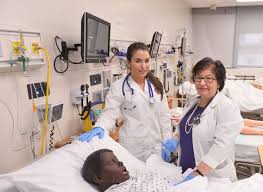Nursing is a challenging profession. You must be well-versed in the body’s inner-workings, and you have to know a range of treatments, techniques, and theories. All of this knowledge does not arrive overnight, though. Luckily, it can be learned by enrolling in a college nursing program. There is a range of programs devoted to training aspiring nurses. Some, such as Grand Canyon University Nursing, allow students to pursue a degree plan based on their specific interests. Regardless of what area of nursing you want to specialize in, you will have to take some classes as part of the core curriculum.

The following are four of the classes that every nursing student can expect to take as part of their degree. These classes establish the basis of knowledge that the nursing profession relies on. If you are interested in enrolling in nursing school, you will likely find yourself taking all of these classes at some point in your educational career.
Anatomy and Physiology
Anatomy and physiology is often the first course required for any degree program in a medical profession. Before learning about the nursing profession, you must be familiar with the human body and its functions. This course is often also referred to as a weed-out course. In short, it is notoriously difficult, and many students drop the course or change their career paths after enrolling. Good nursing programs such as Grand Canyon University Nursing do not set courses up to fail students, though. This class should build knowledge and prepare students to continue learning about human health.
Nutrition and Wellness
In addition to understanding the human body, nurses will need to understand the role of food and nutrition in patients’ wellbeing. Nurses are often tasked with helping patients eat and determining what they will eat, so this knowledge is imperative in order to effectively help and treat patients. With the right nutrition, a patient’s condition can improve drastically. With the wrong nutrition, however, they might see their condition worsen. Programs such as Grand Canyon University Nursing offer classes in nutrition to training aspiring nurses in the basic principles of effective nutrition for patients’ benefit.
Nursing Practice and Theory
Once students have learned the basic concepts of the human body, its functions, and its nutritional needs, they will likely move on to learning the basics of the nursing theory. Of course, nursing might rely more on practice than theory, but the profession boasts a long history of innovation and research that students should understand before applying skills in a hands-on setting. Grand Canyon University Nursing, for example, offers courses in various aspects of nursing theory so that students understand the ideas behind the care they provide. This is an important foundation for any student who wants to practice effectively.
Nursing and Cultural Awareness
In recent years, there has been an increased focus on cultural sensitivity in health care settings, and nursing is no exception. Medical facilities see a hugely diverse population of patients, and it is ignorant to adopt a one-size-fits-all approach to care. Accordingly, many nursing schools now include classes on nursing and cultural awareness that train students to treat patients according to their cultural preference. This is important progress, and it helps students enact the entire purpose of nursing effectively—to help people and foster their health. Doing so in a culturally appropriate manner is absolutely imperative.
These are just a few of the courses you can expect to encounter when you are enrolling in a college nursing program. There are many more that you will take, but these will likely be part of the foundational curriculum. If you are interested in nursing, find a school that includes these classes as well as courses relevant to your interests.
